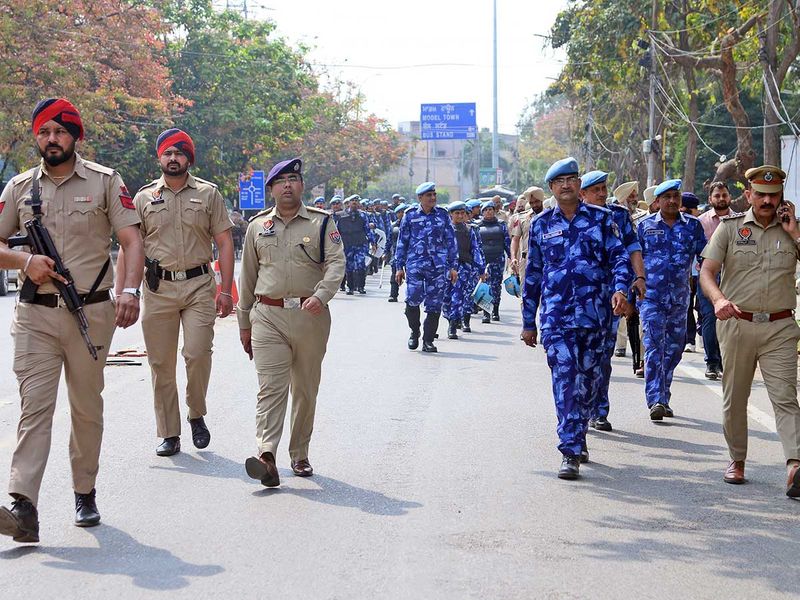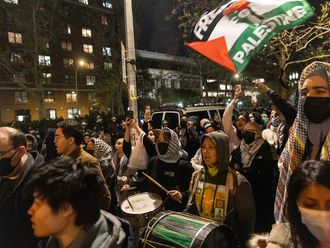
Amritpal, who? This response, which would have been perfectly valid till a few weeks back, is impossible today. For Amritpal Singh, the fugitive neo-Khalistani leader, is India’s most wanted man.
I say “neo-Khalistani” advisedly, because the first blood-soaked wave of the Sikh separatist movement was brought to an effective end by the early 1990s largely by India’s “super cop,” KPS Gill, with the support and blessings of both the state and central governments.
Admittedly, Khalistani separatism did not enjoy, even in its heyday, the support of large sections of Sikh populace in Punjab. It consisted of small groups of young “militants,” who were reacting to the army’s assault on Harmindar Sahib, more famously known as the Golden Temple.
“Operation Bluestar,” ordered by then Prime Minister Indira Gandhi, did result the flushing out and killing of “Jarnail” Singh Bhindaranwale, a charismatic extremist, who was holed up in the “Golden Temple,” with his armed militia.
From there, he ran a parallel administration, issuing orders, carrying out targeted killings in defiance of the law-and-order authorities or the writ of the Indian state.

In the aftermath of “Operation Bluestar,” Indira Gandhi was assassinated by two of her own bodyguards, both of whom were Sikhs. Khalistanis also carried out killings and violent attacks abroad, the worst of which was the downing of Air India Flight 182 on June 23, 1985.
Canadian Khalistani terrorists had planted bombs, which exploded when the plane was flying from Montreal to London. All 329 people aboard, including 268 Canadians, 27 British, and 24 Indian were killed, making it one of the deadliest such attacks in civilian airline history.
From trucker to fugitive leader
Only thirty, and recently married to a bride from United Kingdom, Amritpal Singh, was attempting to revive the Khalistani movement in Punjab. He is now on the run or untraceable. But over a hundred of his associates have been apprehended, along with a large cache of illegal weapons and satellite phones.
The authorities have also arrested some members of his support system, who were arranging millions of rupees of finances. In fact, one of his abandoned cars, after the supposedly unsuccessful 50 kilometre car chase through the villages and fields of rural Punjab, was an expensive Mercedes.
This is, to say the least, rather unusual for someone who barely passed the 10th standard in high school. He enrolled in a polytechnic in Kapurthala, Punjab, but dropped out. Till a few months back, he was a trucker overseas.
After the killing of rebel singer Deep Sidhu “Moose Wala” on May 29 last year, Amritpal Singh came back to India September 2022. On Sep. 29, 2022, Amritpal Singh took over as the head of “Waris Punjab De” (Heirs of Punjab”) on the first anniversary of its founding, much against the objection of the relatives of “Moose Wala.”
He also became a “born again” Sikh by taking amrit (nectar), donning blue robes, wearing a sword, and growing back his beard. Quite a far cry from a clean shaven, short haired young man who was posting photos on social media to draw attention to himself like other young men and women of his generation.
Amritpal’s provocative actions
Amritpal was briefly put under house arrest at village Singhwala in Moga district in connection with the murder of Sudhir Suri, allegedly by one of Amritpal’s associates, Sandeep Singh or “Sunny.”
He also came into the news became he led members of “Waris Punjab De” in setting fire to furniture in a Gurdwara (Sikh Temple) in Biharipur village.
Increasingly, his statements and actions became more and more provocative and flagrant. He even said, “Bhindranwale is my inspiration. I will walk the path shown by him. I want to be like him … but I am not copying him.”
Threat to law and order
The breaking point came last month, when the Punjab police arrested his close associate, Lovepreet Singh “Toofan” (storm). Amritpal demanded that Lovepreet be released.
When they did not heed to his “ultimatum,” his supporters overran barricades, attacked the police station armed with automatic rifles and swords, injuring several law enforcement personnel. Lovepreet was soon released because the police withdrew charges against him.
Even if the police finally have what seems to be the upper hand, the neo-Khalistanis are by no means confined to Punjab. They are active in Canada, UK, and Australia, among other liberal democracies.
Taking advantage of the numerical strength of overseas Sikhs, which makes them an influential vote-bank, neo-Khalistanis have desecrated temples as in Melbourne or carried out attacks on Indian missions abroad as in London and San Francisco more recently.
The neo-Khalistanis are a threat not only to the Indian state, but to the rule of law and public peace in their host countries.
The Indian authorities are already acting decisively, but Western countries must take strict action against neo-Khalistani activists and activities whenever they break the law.











